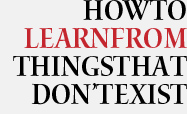Education as a way to understand every relationship – this perspective is at the core of the 31st Bienal. Because of that, there is not a time for education, a time that might come before or after the selection, production or installation of art in an exhibition space. Every moment needs to be one of learning for all those involved: for the artists or participants, invited to develop projects together or in groups, always in collaboration with many, including the Bienal’s permanent and temporary teams; for the curators, obliged to understand every conversation and exchange as exceptional, which means that applying ready-made formulas cannot be an option; for the Bienal and all its staff, driven into new processes and new people, often without choice; for the participants in each of the artistic projects and the visitors themselves, exposed to experiences of seeing, talking, dancing, eating, moving, in ways that should, on every occasion, bring something unexpected.
Education started at the very beginning of the process, with the Bienal’s education team engaged in the initial stages of researching the artists’ projects creating a relationship that continues throughout the build-up to the exhibition, and that results in a mediation in which the works and events are the occasion for an exchange that should be radically open, undecided from the start. Education also started with as series of ‘open meetings’, in which diverse groups of people were convoked in cities such as Belém, Belo Horizonte, Fortaleza, Bogotá, Lima, Porto Alegre, Recife, Salvador, Santiago, São Carlos, São Paulo or Sorocaba to discuss local urgencies and perspectives. Also in the workshop A Toolbox for Cultural Organisation, for which sixteen young artists, curators, writers and educators have and will be gathering for three weeks in January, May and October 2014, to think together how to intervene in and through culture in different times and places.
There is also no single space for education that is set apart from those of working, contemplating, resting, even eating. Education must happen everywhere: at the restaurant/café, where those who cook learn, and where those eat learn from those who cook; in the exhibition spaces, where interactions between images, objects and people, including visitors and educators, propose new questions and formulations; in the ateliers or the streets where these images and objects are made; at workshops, such as A Toolbox for Cultural Organisation, where acts of collaborative learning will hopefully result in a permanent transformation; or at the ‘open meetings’, which are possible only in collaboration with local institutions both small and large.
Education, finally, takes place in intimate and large scale; from one-to-one exchanges to group visits; from saraus, in which culture is made by anyone, to conferences, in which knowledge is shared to all those present. These moments occur with the same intended effect: the transformation of all those who come into contact with the 31st Bienal into something that they were not before.




